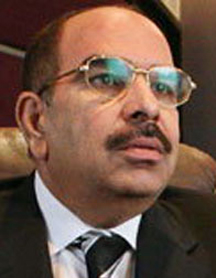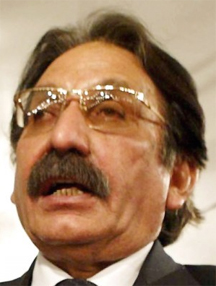ISLAMABAD, (Reuters) – A Pakistani real estate tycoon yesterday accused the chief justice of turning a blind eye to his son’s alleged corrupt financial practices, in a scandal that could damage one of the few public figures willing to take on the powerful military.

Malik Riaz, who fashions himself as a billionaire philanthropist, said he had given almost $3.6 million in bribes to Arsalan Iftikhar, son of Chief Justice Iftikhar Chaudhry.
Riaz, who has been accused of fraud, suggested that Chaudhry knew about the matter in advance of the Supreme Court’s hearings on the issue this week. Riaz has denied all allegations.
“I have three questions for the chief justice of Pakistan. He should tell the nation today that in the dark of the night how many times did he (Chaudhry) meet me,” said Riaz.
“He should tell us how long he has known about this case and why he did not take suo motu action.”

Iftikhar has denied any wrongdoing. Chaudhry said he would not get involved in the case, which is dominating headlines in nuclear-armed Pakistan.
The Supreme Court registrar said in a statement to the media that the chief justice had met Riaz, but at a time when Chaudhry was suspended by then President Pervez Musharraf.
Chaudhry became a household name in Pakistan and gained international recognition in 2007 when he stood up to Musharraf over his legally questionable bid to hold on to power.
Since then Chaudhry has emerged as a centre of power in Pakistan, taking on the unpopular government over allegations of corruption, and more significantly the military, which has ruled the country for more than half of its 64-year history.

Chaudhry took up cases involving kidnappings and torture of suspected Islamist militants allegedly carried out by the military and intelligence agencies. They deny the charges.
Under his leadership the Supreme Court convicted Prime Minister Yusuf Raza Gilani of contempt for failing to re-open corruption cases against President Asif Ali Zardari.
CONTROVERSIAL
MEMO
Hours before Riaz spoke to reporters in Islamabad, a Supreme Court commission concluded that Husain Haqqani, the country’s former envoy to Washington, wrote a memo which sought U.S. help in reining in the mi l itary, findings that could re-ignite tensions between generals and the civilian leadership.
Fresh political instability gripped Pakistan during the deepest crisis in ties with Washington since the South Asian country joined the U.S.-led war on militancy in 2001.
Ties between the strategic allies have deteriorated since the unilateral raid that killed Osama bin Laden in Pakistan last year and humiliated the military.
The United States said on Monday it was withdrawing its team of negotiators from Pakistan without securing a long-sought deal on supply routes for the war in neighbouring Afghanistan, publicly exposing a diplomatic stalemate.
A senior U.S. government official told Reuters that Pakistan’s civilian government should “bite the bullet” and re-open the routes in order to ease tensions with Washington.
The latest scandals to distract Pakistan from problems including a struggling economy, chronic power cuts and a Taliban insurgency are likely to reignite rivalries between competing power centres that have plagued the nation for decades.
Chaudhry, the one man with the clout to possibly keep the government and military in check, is unlikely to lose his job. But the allegations may weaken him.





